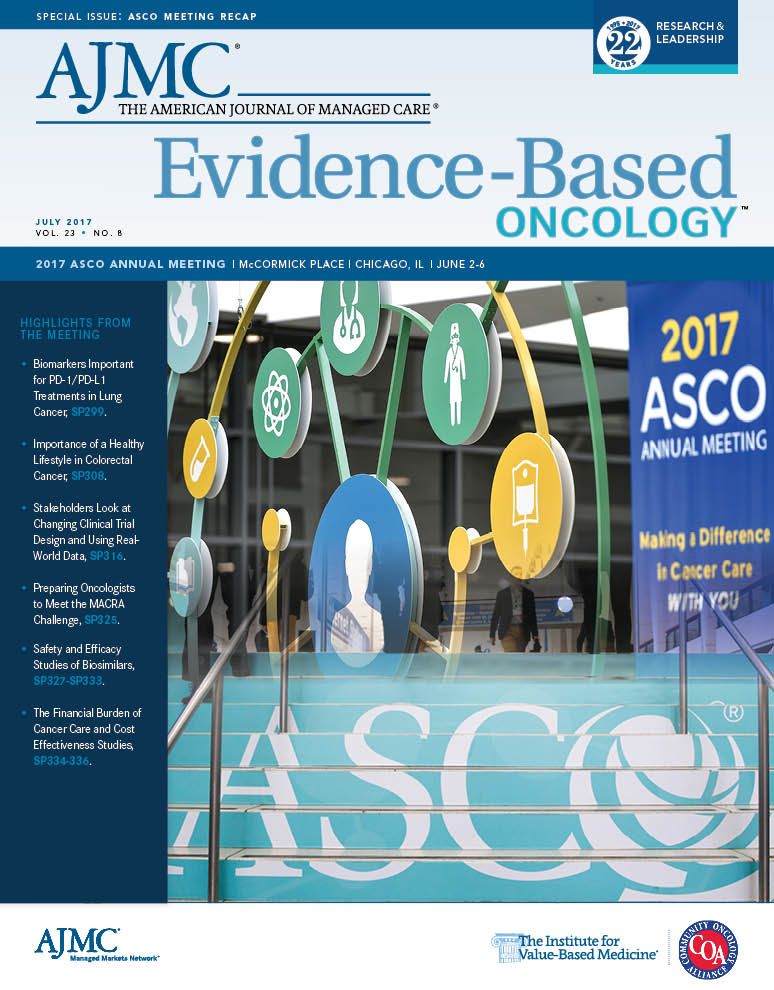- Center on Health Equity & Access
- Clinical
- Health Care Cost
- Health Care Delivery
- Insurance
- Policy
- Technology
- Value-Based Care
Daratumumab With Standard Regimen Improves PFS, ORR Independent of Cytogenetic Risk in Multiple Myeloma
Updated trial results at the 2017 Annual Meeting of the American Society of Clinical Oncology showed the combinations of daratumumab with either lenalidomide and dexamethasone or bortezomib and dexamethasone prolonged progression-free survival for patients with relapsed refractory multiple myeloma.
IN AUGUST 2016,
daratumumab (Darzalex) was granted breakthrough designation status as second-line treatment for use in combination with either lenalidomide (Revlimid) and dexamethasone (DRd regimen, POLLUX trial) or bortezomib (Velcade) and dexamethasone (DVd regimen, CASTOR trial) for patients with relapsed refractory multiple myeloma (RRMM) who have received at least 1 prior therapy.1 Updated trial results at the 2017 Annual Meeting of the American Society of Clinical Oncology2 showed the combinations prolonged progression-free survival (PFS) and improved the depth of response, independent of the patients’ cytogenetic risk.
Daratumumab is a human monoclonal antibody that targets CD38, a receptor overexpressed in multiple myeloma, resulting in complement-dependent cytotoxicity, antibody-dependent cell-mediated cytotoxicity, and antibody-dependent cellular phagocytosis. The authors examined their efficacy in patients with RRMM with standard or high cytogenetic risk status.
Bone marrow aspirates for patients who participated in the open-label, multicenter, active-controlled, randomized POLLUX and CASTOR studies were collected at screening and assessed via next-generation sequencing (NGS). Patients with high-risk cytogenetics included those who had at least 1 of the following translocations or deletions: t(4;14), t(14;16), or del17p. Patients at standard risk were negative for these abnormalities.
While 311 patient samples were analyzed via NGS from the POLLUX trial, 353 were from the CASTOR trial. At a median follow-up of 25.4 months, 65% of patients receiving DRd in the intention-to-treat population (POLLUX) had a median PFS of 24 months, compared with 41% of the control Revlimid-treated (Rd) population who had a median PFS of 17.5 months (HR, 0.41; 95% CI, 0.31-0.53; P <.0001). Of patients who had received 1 prior line of therapy, median PFS was not reached in 79% of the cohort receiving DRd; it was 19.6 months in 40% receiving Rd (HR, 0.39; 95% CI, 0.26-0.58; P <.0001).
At the end of a 19.4-month follow-up period (CASTOR trial), 49% of patients receiving DVd had a median PFS of 18.7 months compared with 8% patients treated with Velcade (Vd) who had a median PFS of 7.1 months (HR, 0.31; 95% CI, 0.24-0.39; P <.0001). In patients who had received 1 prior line of therapy, a median PFS was not reached in 60% of patients in the DVd arm compared with a median PFS of 7.9 months in 12% of patients in the Vd arm (HR, 0.19; 95% CI, 0.12-0.29; P <.0001).
Cytogenetic risk analysis in patients in the POLLUX study showed DRd improved median PFS to 22.6 months in the high-risk patient population compared with 18.2 months in the Rd arm (HR, 0.53; 95% CI, 0.25 to 1.13; P = .0021). Median PFS was not reached in the standard-risk patients treated with DRd compared with 18.5 months in those receiving Rd (HR, 0.30; 95% CI, 0.20-0.47; P <.0001). Median PFS for high-risk patients in the CASTOR study was 11.2 months in the DVd arm and 7.2 months in the Vd arm (HR, 0.45; 95% CI, 0.25-0.80; P = .0053). In standard-risk patients, daratumumab improved median PFS to 19.6 months, against 7.9 months with Vd (HR, 0.26; 95% CI, 0.18-0.37; P <.0001).
The authors concluded that daratumumab included in standard-of-care regimens in RRMM prolongs PFS and improves the depth of response regardless of cytogenetic risk. Longer-term survival results are awaited for both trials.REFERENCES
1. Dangi-Garimella S. Breakthrough for daratumumab for use as second-line treatment with standard of care in multiple myeloma. The American Journal of Managed Care® website. www.ajmc.com/journals/evidence-based-oncology/2016/august-2016/breakthrough-for-daratumumab-for-use-as-second-line-treatment-with-standard-of-care-inmultiple-myeloma. Published August 19, 2016. Accessed June 5, 2017.
2. Weisel KC, Miguel JS, Cook G, et al. Efficacy of daratumumab in combination with lenalidomide plus dexamethasone (DRd) or bortezomib plus dexamethasone (DVd) in relapsed or refractory multiple myeloma (RRMM) based on cytogenetic risk status. J Clin Oncol. 2017;35(suppl; abst 8006).


